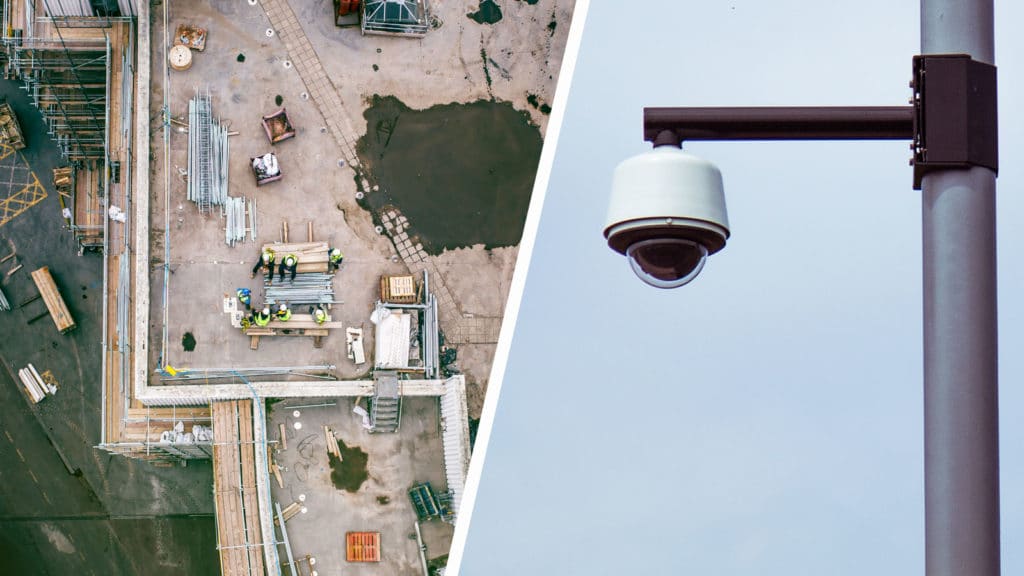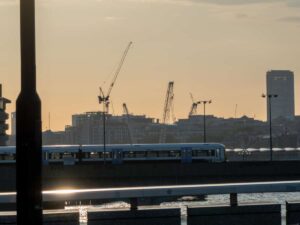When it comes to construction sites, site security is just as important as the works happening on site. An unsecured construction site can be prone to vandalism and theft, which regardless of insurance levels can cause delays due to missing equipment and time taken to investigate it. Or worse yet; an unsecured site could be accessed by untrained people, which could lead to them being injured or killed. This may sound highly unlikely, but this is still something that happens every year. The prevention of unauthorised access to site must be taken seriously. Construction site security should be at the top of the priority list for any construction contractor. To increase construction site security, we suggest the following points:
carry out a risk analysis
Before committing to any security based solutions, it’s advisable to first carry out a risk analysis; this can either be taken up in house or through an external contractor like ourselves. In general, a risk analysis should take all the potential threats and hazards that could impact the construction site into account, and assess their likelihood and the severity if they should happen. For each of these points, policies, further investment can be put in place to reduce or mitigate them.
One key point with risk analysis is that you should continually review it, not just annually but as the site changes. We’ve seen far too many cases where policies that were designed for the safety of a site initially are still used years into the construction project, despite having no relevance to it’s current state.
ensure that THE perimeter is secured
With regard to security, it should be a primary focus to invest into systems that stop theft happening in the first place, rather than a recording device such as CCTV, which usually only helps provide evidence after the incident. Secure fencing and gates should be installed and suited to the purpose of the site. Temporary work sites with minimal equipment can suffice with a temporary ‘Herras’ style fence, where as complex sites in city centres may need palisade or mesh.
Regularly check these during construction to ensure that they are not at any point damaged. Particularly with temporary fencing, it’s all too easy to remove sections to allow loading/unloading and then forget to close them – leaving the site exposed. You also may need to take extra precautions to secure your sites perimeter if it’s within or near an area such as a school or public facility. Systems that automatically check for continuity in the fence line should be a consideration for investment if so is the case.
manned guarding
One of the best examples of a method to secure sites is manned guarding. This can be provided through permanent staff or ‘tours’ where staff will attend site on a regular basis. Generally, despite being the most expensive option; it is very hard to beat the effectiveness of a physical attendance. Using a comprehensive provider like ourselves also means trained guards can be provided for things such as fire alarm testing during the same visit, thereby reducing supply chain and costs. For extra security, guards can also use ‘tag points’ to provide an audit trail of their patrols should there be an incident.
cctv security
CCTV can be a comprehensive way of tracking who enters your construction site, offering significant cost savings over manned guards. Stand alone CCTV works well both as a deterrent and to provide evidence for incidents. For more complex sites, the system can be linked to a surveillance control room. These get alerts based on motion on the cameras, and can provide audio ‘talk back’ to shout intruders off site or even request attendance from police or a manned guard contractor.
We’ve been installing CCTV and surveillance control rooms for over a decade for a vast variety of clients. Learn more about our UK leading CCTV surveillance installation, monitoring and maintenance here.
have incident response protocols in place, for all levels of security breach
All too frequently, minor security breach incidents aren’t responded to properly by contractor and sub-contractor staff. Small incidents such as trespassing often go unreported and are ignored. This leads to them not being followed up, or addressed in the future to reduce them happening.
Instead, a proper incident response plan should be formulated and rigorously followed to handle incidents of every level. This will help constantly improve your on site processes. An effective incident response plan can keep staff aware of what security systems are in place and how to operate them. Too often we see sites come to review their CCTV after a serious incident, to find it wasn’t working, was unfit for purpose, or staff hadn’t followed procedure simply because they weren’t aware.
implement THOROUGH WORK POLICIES
As part of your risk analysis, you should develop policies that help mitigate identified risks. Something simple such as ensuring that tools are not left on site during out of hours, will help reduce not only chances of theft, but also chances of serious injury or death for intruders.
Another example of a security based policy that could be implemented would be ensuring that pits and excavations are clearly marked and protected with barriers when not in use. Although construction site workers are informed about pits and excavations upon induction, intruders or others who access site in an authorised manner won’t have such knowledge. For this, try to utilise simple and easy to implement procedures. Avoid wherever possible complex policies, forms, or multi step protocols unless absolutely necessary.
implement a sign in and out policy
Thorough management and documentation of who enters and leaves site is essential for construction site security. The management of all site entry points will help increase site security, ensuring that unauthorised personnel are not on site. Compulsory staff badges can also be implemented to make sure that everybody on site is accounted for. Like with other work policies, this is something that should be clearly outlined in site inductions.
To reduce overheads for this sort of work, we provide various key-fob entry/exit turnstile products to numerous clients, so that they have a live record of who’s on site. Systems like this can even keep track of site induction dates, so staff won’t be allowed through the turnstile if their qualifications aren’t up to date. Modern systems can even accommodate fingerprints (and can be read even with dirty hands), meaning there’s no longer the ‘I forgot my key-card’ excuse. This also helps eliminates the risk of staff swapping passes.
make sure you accompany visitors
With many construction projects having frequent visitors on a daily basis, contractor and sub-contractor staff may sometimes let site visitors walk around on their own. This is particularly the case with visitors who have visited site multiple times. However, letting site visitors walk around alone poses a security and safety risk. Even if you are sure of a visitors identity, you must always bear in mind that they are not a member of site. This means they could potentially be a threat to site security if left alone, as they could potentially commit theft or pose a safety risk to themselves or others.
Thanks for reading- hopefully you’ve learned more about how to ensure your construction sites’ security. Remember, if you want to take a load off when it comes to securing your construction site, considering utilising our industry leading Security and Technical services. We’ve been working within the security industry for over two decades, and hold accreditations such as NSI Gold, IPAF, CSCS and ISO 9001, along with being a Paxton Gold Installer.
[contact_cta]



